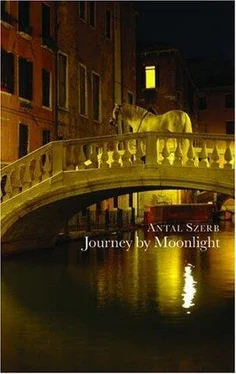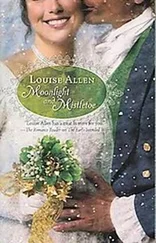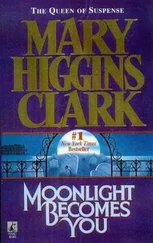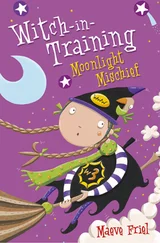“Yes. Partly.”
“And do you agree with your friend?”
“Yes,” said Ellesley, nodding sadly.
The girl again thought for a while, then clenched her fist.
“But he was so kind to me! I just wish I knew the bastard’s name.”
Her eyes filled with tears. Ellesley consoled her:
“But there’s no great harm done. Now you can write in your notebook that you’ve been to Foligno.”
“I already did,” she said with a sniffle.
“Well, there you are,” said Mihály. “Tomorrow you’ll go happily back to Perugia and continue your studies. I’ll take you to the train. I’ve already had the experience of getting on the wrong one.”
“That’s not the point. The shame of it, the shame of it! To treat a poor defenceless girl like that! Everyone told me not to trust Europeans. But I’m such a straightforward person myself. Can you get whisky here?”
And they sat together until midnight.
The girl’s presence had a lively effect on Mihály. He too drank whisky, and became talkative, although mostly it was the girl who spoke. The little doctor became very quiet, being naturally shy, and finding her rather attractive.
The girl, whose name was Millicent Ingram, was quite wonderful. Especially as an art historian. She knew of Luca della Robbia that it was a city on the Arno, and claimed that she had been with Watteau in his Paris studio. “A very kind old man,” she insisted, “but his hands were dirty, and I didn’t like the way he kissed my neck in the hallway.” That aside, she talked about art history, passionately and pompously, without stopping.
It gradually emerged that she was the daughter of wealthy Philadelphia parents who enjoyed considerable influence in high society, at least as she saw it, but that some Rousseauistic tendency in her drove her towards solitude and nature, which from her point of view meant Europe. She had attended study semesters in Paris, Vienna and other fine places, but none of it had had any effect. Her soul had preserved its American innocence.
And yet, as Mihály walked home and prepared for bed, he hummed cheerfully to himself, and his apathy slipped away. “Millicent,” he said. “There’s someone in the world actually called Millicent! Millicent.”
Millicent Ingram was not the mind-boggling, soppily-named, beautiful American girl to be seen in Paris in the years after the war, when everything else in the world was so drab. It was only in the second of those contexts that Millicent could be classed as an American beauty. The basis of this beauty, though the word is perhaps an overstatement, was that her face was quite devoid of expression. But in any event she was very good-looking, with a little nose, a wholesome mouth that was large (and painted larger) and a fine athletic figure. Her muscles seemed as elastic as rubber.
And she was American. Indisputably of that class of wonderful creatures exported to Paris in Mihály’s youth. The ‘foreign woman’ is an element of young manhood, of footloose youth. What remains in later years is the undying nostalgia, for in the footloose years we are still gauche and timid, and let slip the better opportunities. Mihály had now lived for so long in Budapest that his lovers had all been from that city. The ‘foreign woman’ now rather denoted his youth. And liberation: after Erzsi, after the serious marriage, after so many serious years. An adventure, at last: something coming unexpectedly and moving towards an unforeseen conclusion.
Even Millicent’s stupidity was attractive. In the deepest stupidity there is a kind of dizzying, whirlpool attraction, like death: the pull of the vacuum.
It so happened that the next day, when he had escorted her to the station, and they were about to buy the ticket, he said:
“Why are you going back to Perugia? Foligno is a city too. Why not stay here?”
Millicent looked at him with her stupidly serious eyes, and said:
“You’re right.”
And she stayed. That day was rather hot. They spent the whole of it eating ice-cream and talking. Mihály had the skill that makes English diplomats so feared in their profession: he knew how to be extremely dim when the need arose. Millicent noticed nothing of the intellectual distance between them. Indeed, she felt herself at an advantage because of her art history studies, and this rather flattered her.
“You are the first European I’ve met who really understood me intellectually,” she said. “The others were so dull, and took no interest in art.”
He had won her complete confidence. By evening he had gleaned everything there was to know about her, not that there was anything worth knowing.
That evening they met Ellesley at the café. The doctor was quite surprised that the girl was still in Foligno.
“You know, I decided I can’t always be thinking about problems of art,” she told him. “A doctor friend of mine said that prolonged intensive study is bad for the skin. Isn’t that so? Anyway I decided to switch myself off for a bit. I’m giving myself an intellectual holiday. Your friend has such a calming influence on me. Such a kindly, simple, harmonious soul, don’t you think?”
Ellesley noted with resignation that his patient was courting the American girl, and grew even quieter. For he was still very attracted to Millicent. She was so different from Italian women. Only the Anglo-Saxon type can be so clean, so innocent. Millicent — innocent: what a splendid rhyme that would have been, if he had been a poet. But no matter. The main thing was that this heaven-sent delight was doing visible good to his dear Hungarian patient.
The next day Mihály and the girl went for a long walk. They ate their fill of pasta in a modest village tavern, then lay down in a classical-looking wood and slept. When they awoke, Millicent observed:
“There’s an Italian painter who painted trees just like these. What was his name?”
“Botticelli,” replied Mihály, and kissed her.
“Ooooh,” she said, with horror on her face. Then she kissed him back.
Now that he held the girl between his arms, Mihály decided happily that she did not disappoint. Her body was as elastic as rubber. Oh the ‘foreign woman’ made flesh — how much she means to the man whose passion pursues fantasy and not physiological fact! The pleasure of the preliminary and quite innocent kiss suggested that every detail of Millicent’s body would prove foreign, other, wonderful. Her healthy mouth was entirely American (Oh, the prairies!), the little hairs on her neck were foreign, the caresses of her large strong hands, the transcendent cleanliness of her well-scrubbed body (Oh Missouri-Mississippi, North against South, and the blue Pacific Ocean!) …
“Geography is my most potent aphrodisiac,” he thought to himself.
But in the evening a letter was waiting for Millicent at the post-office, forwarded from Perugia. It was from a Miss Rebecca Dwarf, Professor of Medieval Art History at the University of Cambridge (Mass.), Millicent’s tutor and chief spiritual adviser. Over dinner Millicent tearfully explained that Miss Dwarf was very satisfied with her previous letter in which she had spoken about the progress of her studies, but deemed it absolutely essential that she should now travel forthwith to Siena, to see the famous Primitives.
“But it was so good to be with you, Mike,” she sniffled, and put her hand in his.
“So you must go without fail to Siena?”
“Of course. If Miss Dwarf says in her letter … ”
“To hell with the old cow,” Mihály broke in. “Look, Millicent, listen to me. Don’t go and see the Siena Primitives. The Siena Primitives are probably almost identical to the Umbrian Primitives you saw in Perugia. And anyway, does it really matter whether you see ten pictures more or less?”
Читать дальше












